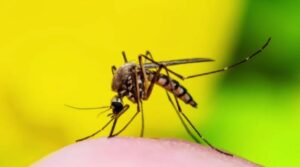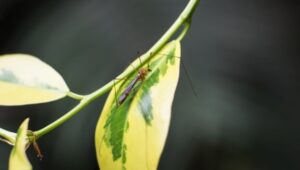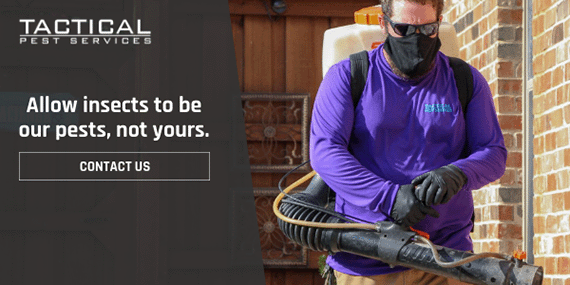With the weather warming up, spring brings a bunch of bugs with wings to Texas. The two common flying bugs you’ll see this time of year are crane flies and mosquitos. One is harmless, and the other will have you itching for days. How to tell the difference? Read more to find out!
Mosquitos
For many residents in Texas, mosquitos are the least liked bug due to the itchy spots that result from their bites. Mosquitos have a humped form and keep their wings folded over their back. These insects will willingly live inside, especially if there is sitting water. If they enter your home, you can find them next to potted plants or in your kitchen or bathroom. Male mosquitoes only live for about a week, while female mosquitoes live for about two weeks. They are most active during dawn or dusk when the sunlight isn’t as bright. As many people know, mosquitoes drink human and animal blood, which is why they’re disliked by many. These insects can hold, on average, 5 mg, which takes about six bites before they’re full. They also carry viruses and transfer them to humans and animals. Male mosquitos stick to plants and feed on their nectar, while females target humans and animals for a blood meal. This is because they need the protein in the blood to develop their eggs. Their needle-like mouth, called a proboscis, pierces the skin to suck up blood. Unfortunately, it can also transmit dangerous diseases like malaria, Zika, West Nile, and dengue fever. So next time you see mosquitoes swarming you, remember it’s probably a female looking for a protein boost to develop her eggs. Mosquitoes pose a real threat, possibly transmitting illnesses through their bites.

Crane Flies
These bugs are misunderstood and have a bad reputation for looking similar to mosquitos, but they’re harmless overall. You can identify a crane fly by how they clumsily bop their body along the wall or door. Crane flies have a straight back and rests their wings out wide. These insects are attracted to light, so if one ends up inside your home, guide it back outside because that’s where it’s trying to go. They like to stay outside, close to their breeding grounds, where they can reproduce. Crane flies live for 10 to 15 days and are most active at night. The probability of getting stung or bitten by a crane fly is zero because they don’t have mouths; they only eat plants during the larval stage. Crane flies are harmless visitors, and their presence around your property is more of an annoyance than a health concern.

Mosquito Services
If you’re seeing unwanted visitors like crane flies or mosquitoes more frequently around your home, we’re here to help! At Tactical Pest Services, we offer various pest extermination services to address any problems you may have. We have two monthly mosquito services if you’re looking for mosquito treatment. The first is our Traditional Mosquito Service, which includes seven annual services (Monthly – April through December). This treatment is a modern derived mosquito concentrate and mixtures. During the treatments, we inspect mosquito breeding sites and treat all bushes, trees, grass, leaves, mulch, and any other areas deemed necessary by our technicians during inspections with a power misting backpack. The other option is ourNatural Alternative Mosquito Service, which includes ten services per year (Every 21 days – April through October). The treatment is the same process as previously stated, the only difference is we use naturally derived formulas containing oils such as lemongrass, cedar wood, and Geraniol.
Cranefly Services
If you’re looking for a pest service that will treat annoying insects like crane flies, wasps, and more, then your best option is the Traditional Pest Service. This treatment includes four services per year and uses modern-derived pesticides. This service removes webs, wasps, nests, and mud daubers from doors, windows, and eaves. It consists of power spraying the exterior perimeter of your home (10-foot ban) AND any specialty areas we find during the inspection. Another option is the Natural Alternative Pest Service, which includes six yearly services. This treatment uses naturally derived pesticides and results similar to the traditional plan.


